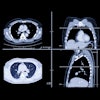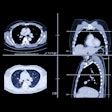
Executive health screening programs at major U.S. hospitals continue to provide CT coronary artery calcium (CAC) scoring, echocardiography, and other imaging-based screening tests against clinical recommendations, according to a research letter published online January 13 in JAMA Internal Medicine.
Hospitals have responded to the recent demand for personalized early diagnostic health screening by establishing executive health programs, generally targeting wealthy individuals who are able to pay directly for screening tests not covered by insurance companies, noted co-authors Dr. David Brown and Alan Ge from Washington University School of Medicine in St. Louis.
To assess the quality of cardiovascular screening at executive health programs, the researchers obtained data from 28 distinct programs available at 18 of the top-ranked hospitals for cardiology and heart surgery per the U.S. News & World Reports from 2016 to 2019. Appointment fees for the programs ranged from roughly $1,000 to $25,000.
Collectively, the executive health programs offered 12 different cardiovascular screening tests for asymptomatic individuals. All of these tests went against the current recommendations of major academic and governmental bodies, including the U.S. Preventive Services Task Force and the American Heart Association.
Nearly 43% of the programs performed CT CAC scoring on healthy individuals with no clinical indications for the test. Only about 16% of the programs submitted claims to an insurance carrier, though reimbursement was not confirmed for any of these claims.
"Offering executive physicals with tests that are not recommended for healthy persons to anyone who can pay out of pocket potentially sends the message to trainees that a two-tier healthcare system is acceptable, and that evidence is not important," the authors wrote. "Furthermore, indiscriminate screening can create a cascade effect and thus violate the principle of primum non nocere (first do no harm) wherein unnecessary tests may ... cause avoidable physical or psychological harm."
The question remains: Do individuals have the right to receive a medical test they are willing to pay for using their own resources?
Perhaps so -- but with caveats, noted Dr. Rita Redberg from the University of California, San Francisco and Dr. Mitchell Katz of New York City Health and Hospitals in an editor's note.
"Even if a patient is willing to pay for a test or medication, we should not be willing to cause them harm," Redberg and Katz wrote. If executives are spending their time and money on these tests because they believe that they will help them, "that belief is mistaken and undermines the legitimacy of cardiac executive screening programs."




















